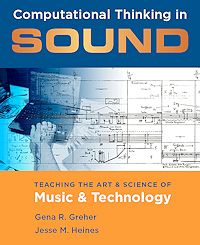 Computational Thinking in Sound provides music fundamentals
educators with a one-of-its-kind text devoted specifically to music,
sound, and technology. Using a student-centered approach that
emphasizes project-based experiences, the book discusses multiple
strategies to explore, create, and solve problems with music and
technology in equal parts. It also provides examples of hands-on
activities that encourage students, alone and in groups, to explore the
basic principles that underlie today’s music technology and freely
available multimedia creation tools.
Computational Thinking in Sound provides music fundamentals
educators with a one-of-its-kind text devoted specifically to music,
sound, and technology. Using a student-centered approach that
emphasizes project-based experiences, the book discusses multiple
strategies to explore, create, and solve problems with music and
technology in equal parts. It also provides examples of hands-on
activities that encourage students, alone and in groups, to explore the
basic principles that underlie today’s music technology and freely
available multimedia creation tools.
Computational Thinking in Sound is an effective tool for educators to introduce students to the complex process of computational thinking in the context of the creative arts through the more accessible medium of music.
New Year’s Resolutions for the music classroom
Source and additional posts at:
http://blog.oup.com/2016/01/new-years-resolutions-music-education/
“If you are anything like my students, you have a great love for music, whether it’s creating it, performing it, or perhaps a little of both. In addition, you most likely became a music teacher because you wish to share your passion for music with others, just as one of your music teachers lit that spark for you. As we begin a new year, my advice would be to never lose sight of why you began your musical journey in the first place or the emotional hold that music has over you. Smile more, move more, make more music, and talk less about music. Be open to a diversity of modes of musicianship and try to help all your students tap into their innate musicality.”
-- Gena Greher
What is the most important issue in music education today?
Source and additional posts at:
http://blog.oup.com/2014/10/important-issue-music-education-today/
“With the current trend towards turning student evaluations into teacher accountability measures, we risk narrowly focusing music education to those skills based elements that can be easily measured. As music teacher educators we need to resist the urge to succumb to the standardized testing movement and broaden our students’ notions of what it means to be musical. We need to ensure a learner centered music education for all students that fosters creative thinking and divergent outcomes, such as composing, improvising and other forms of sonic exploration and expression through traditional and non-traditional approaches to music making.”
-- Gena Greher
Sound Thinking Course Website
The course website for the last year that we offered the Sound Thinking course is the only one that is still online. Click the link for that course to go to its course website.
- Spring 2016 course co-taught by Gena Greher and Jesse Heines
- Spring 2015 course co-taught by Dan Walzer and Jesse Heines
- Spring 2014 course co-taught by Gena Greher and Jesse Heines
- Spring 2013 course co-taught by S. Alex Ruthmann and Jesse Heines
- Spring 2012 course co-taught by Gena Greher and Jesse Heines
- Spring 2011 course co-taught by Gena Greher and Jesse Heines
- Spring 2010 course co-taught by S. Alex Ruthmann and Jesse Heines
- Spring 2009 course co-taught by Gena Greher and Jesse Heines


 Gena R. Greher is a Professor of Music Education at UMass
Lowell, where she is the 2014-2015 Nancy Donahue Endowed Professor of the
Arts. Her research focuses on creativity and listening skill
development in children and examining the influence of integrating
multimedia technology in urban music classrooms, as well as in the music
teacher education curriculum and School-University partnerships.
Recent projects include: a music technology mentor/partnership with
UMass Lowell music education students and two local K-8 schools;
SoundScape, a technology-infused music intervention program for
teenagers with autism spectrum disorders; and
Gena R. Greher is a Professor of Music Education at UMass
Lowell, where she is the 2014-2015 Nancy Donahue Endowed Professor of the
Arts. Her research focuses on creativity and listening skill
development in children and examining the influence of integrating
multimedia technology in urban music classrooms, as well as in the music
teacher education curriculum and School-University partnerships.
Recent projects include: a music technology mentor/partnership with
UMass Lowell music education students and two local K-8 schools;
SoundScape, a technology-infused music intervention program for
teenagers with autism spectrum disorders; and
 Jesse M. Heines is a Professor of Computer Science at UMass
Lowell with a strong interest in music and its power to interest students in
computing. He teaches courses on graphical user interfaces, web
programming, and object-oriented programming with C++, and has taught the
Sound Thinking course with music professors
Jesse M. Heines is a Professor of Computer Science at UMass
Lowell with a strong interest in music and its power to interest students in
computing. He teaches courses on graphical user interfaces, web
programming, and object-oriented programming with C++, and has taught the
Sound Thinking course with music professors